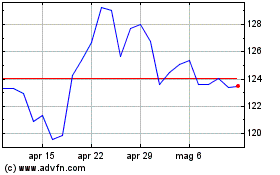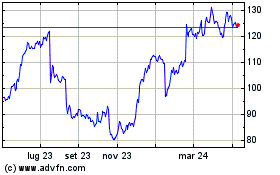Credit-Card Issuers' New Worry: People Are Paying Their Bills
13 Agosto 2010 - 10:44PM
Dow Jones News
America's growing thrift is proving to be a drag for credit-card
lenders.
Since the height of the financial crisis, a big worry for
lenders was that cardholders were falling behind on payments or
defaulting on them altogether. As those trends stabilize, a new
problem is emerging for card issuers, which profit by collecting
interest on unpaid balances: U.S. borrowers, emerging from the
recession, are paying off their credit-card debt more quickly.
That could mean trouble for card issuers such as Capital One
Financial Corp. (COF), Citigroup Inc. (C), Bank of America Corp.
(BAC), American Express Co. (AXP), Discover Financial Services
(DFS) and J.P. Morgan Chase & Co. (JPM), as they struggle with
declining revenue stemming from lower card loan balances.
Card users paid back 19.02% of their balances on average in
June, up from 17.1% a year earlier, according to a Fitch Ratings
index, which tracks about $231 billion of credit card loans.
"There's a noticeable increase in payment rate," says Sanjay
Sakhrani, an analyst at Keefe, Bruyette & Woods. "This
definitely results in lower income because [the card issuers are]
collecting lower interest income."
Sakhrani notes that the average life of a credit-card loan was
shorter at 5.5 months in June, compared with 6.7 months a year
ago.
Lower payments and higher card loan balances are actually
desirable for card issuers in a stable economy; when customers pay
a minimum balance each month, issuers collect more interest on the
unpaid balances.
Card issuers have traditionally replaced lost interest revenue
by increasing late-payment fees and raising interest rates for
customers unable to pay their bills in full. But new rules that
kicked in earlier this year have curbed interest rate increases and
restricted the ability of these companies to charge fees, such as
those hitting card users exceeding their credit limit or paying
late.
It's "more of an uphill battle for card issuers to grow
revenue," says Scott Valentin, an analyst at FBR Capital
Markets.
According to the Federal Reserve, borrowers reduced their
revolving credit lines--mainly card balances--by about $4.5 billion
in June, or at an annualized rate of 6.5%. Since the end of 2008,
they have cut those balances by about $131.6 billion.
Lower card loan balances took a bite out of income for issuers
in the second quarter. At Capital One, revenue fell 9% in the
second quarter from the first quarter to $3.9 billion as average
loan balances declined 4.5%.
"Consumer de-leveraging by definition means that consumers are
paying down debt rather than spending and borrowing," said Richard
Fairbank, Capital One's chief executive, after the bank reported
second-quarter results in July. "While this pressures loan growth,
it also contributes to the improvement in delinquencies and
charge-offs."
For J.P. Morgan, revenue at its credit-card unit fell 13% in the
second quarter from a year ago to $4.2 billion. Its card balances
fell 16% to $146.3 billion during the same period.
Similarly, second-quarter revenue at Bank of America and
Citigroup's credit-card units fell amid lower card loan balances. A
spokesman for J.P. Morgan declined to comment, while officials from
Bank of America and Citigroup were unavailable for comment.
"Overall, we see current payment rates rising toward historic
levels," says Leslie Sutton, a spokeswoman for Discover. Revenue
fell 3% at the company to $1.59 billion in the fiscal second
quarter as loan balances fell by the same percentage. Discover and
its bigger rival, American Express, both issue credit cards and
process transactions.
For American Express, consumers paying off their card balances
more quickly may prove to have a silver lining as the company
issues charge cards, which must be paid off each month, as well as
credit cards that allow customers to carry a balance. AmEx's
revenue rose 13% to $6.86 billion in the second quarter, aided in
part by higher cardholder spending. That was offset by lower card
balances, which fell 9% to $57.3 billion during the period.
"What we are seeing is a strong rise in spending. At the same
time consumer borrowing has been flat to down," says Michael
O'Neill, an AmEx spokesman. "That's largely a function of
households managing their finances very carefully. That's a trend
we anticipated coming out of the recession, and one of the reasons
we focused on our charge-card portfolio."
-By Aparajita Saha-Bubna, Dow Jones Newswires; 617-654-6729;
aparajita.saha-bubna@dowjones.com
Grafico Azioni Discover Financial Servi... (NYSE:DFS)
Storico
Da Giu 2024 a Lug 2024

Grafico Azioni Discover Financial Servi... (NYSE:DFS)
Storico
Da Lug 2023 a Lug 2024
